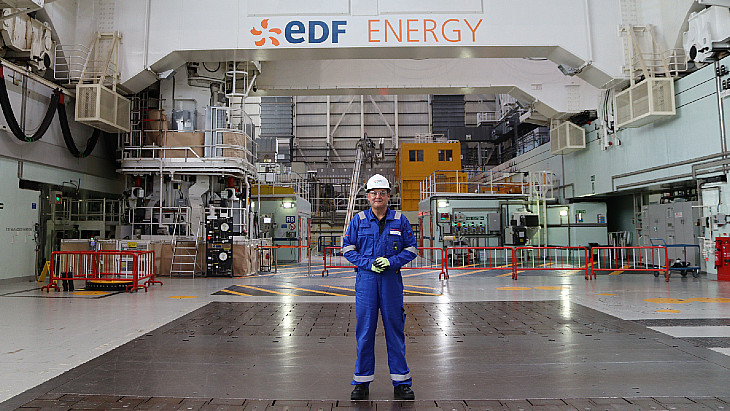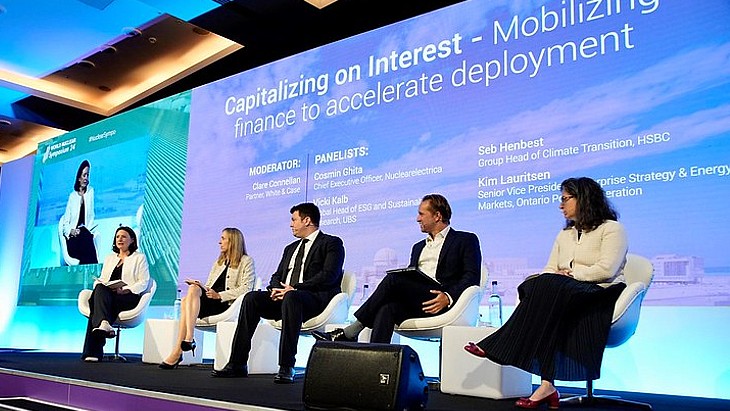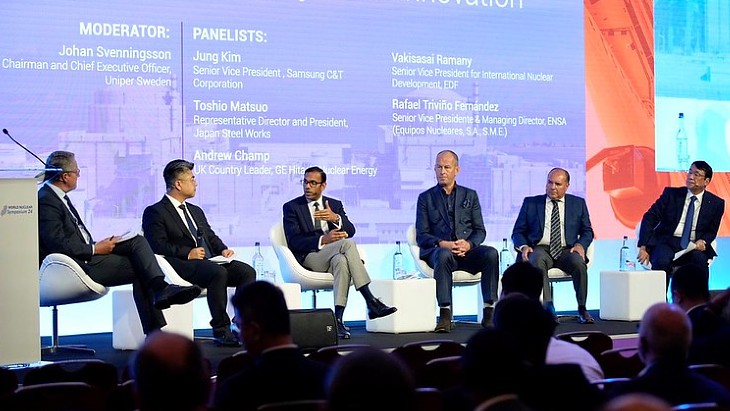Conference: Nuclear gains ground in political debate
.jpg)
Russian state nuclear corporation Rosatom's own annual event, Atomexpo, also draws thousands of participants from across the world. They are already knowledgeable about nuclear power of course and it's anyone’s guess how many of the 6000 attending Russian Energy Week are, but the title of last year's session - The role and prospects of nuclear energy development in the global energy mix - was an indicator of the 'newcomer' status awarded to nuclear power - in spite of its 60-year history.
This year's panel discussion, which was held on 3 October, had a more promising title: Atomic energy - the foundation of global partnership and modern development and was moderated by World Nuclear Association Director General Agneta Rising. The panel members were: Mikhail Chudakov, deputy director general and head of the Department of Nuclear Energy at the International Atomic Energy Agency (IAEA); Alexey Likhachov, CEO of Rosatom; Pekka Lundmark, president and CEO of Fortum Corporation; Yafes Osman, Bangladesh's minister of science and technology; Nenad Popović, Serbia’s minister without portfolio responsible for innovation and technological development; and Peter Szijjarto, Hungary's minister of foreign affairs and trade.
The fact government ministries and state-owned companies made up the panel, and that the nuclear industry's Harmony goal of adding 1000 GW of new capacity by 2050 had captured their imaginations, showed how this clean, reliable and affordable energy source is securing its place in the political debate on climate change and energy demand. Later the same day, Russian President Vladimir Putin made clear references to the role of nuclear power in the global energy mix during the plenary he hosted titled Sustainable energy for a changing world, the panel members of which were drawn however from the oil and gas sectors only. Russia is the world's leading natural gas producer and its second largest oil producer. It is also the world's fourth biggest nuclear power producer (after the USA, France and China). Putin said Russia plans to increase the share of nuclear power in its electricity mix from 16% to 25%.
Rising told World Nuclear News: "It's encouraging to have such a high-level international panel on new nuclear deployment at a general energy forum mainly focused on oil and gas. This is the second year that nuclear power has been on the programme, but it is more prominent this time."
Essential requirements
In her opening remarks to delegates at the nuclear power session, Rising described the "two essential requirements" for the world's future energy system: "It must provide enough energy to meet global development needs and it must do so in a way that does not harm the planet".
The Paris Agreement on climate change, which entered into force in November 2016, had heralded a shift to clean energy, including nuclear power, she noted.
"Currently, nuclear energy provides around 10.5% of the world's electricity from power plants with a combined capacity of 400 GW. The nuclear industry has set a target for nuclear energy to provide 25% of global electricity demand by 2050, which would require the construction of 1000 GW of new nuclear capacity. Achieving this target is a necessary component of a sustainable energy system," she said.
This target requires the rate of new build to treble. "This is practical, this is achievable, and the industry has proven that we can do this," she said. "In the mid-1980s we delivered 30 GW in one year. Over a period of ten to 20 years, we were delivering 20 GW per year. We need to go back to that construction model in order to deliver what is so important for the world - 1000 GW by 2050. We need to establish a level playing field, but we must also have harmonised regulatory processes, we need to be able to timely license new designs of reactors, and we also need to create an effective safety paradigm."
Likhachov described 20-25 GW per year as a "concrete rate" for new build. "We are doing all we can to help achieve that 1000 GW by 2050," he said, but then stressed the international character of the nuclear industry.
"We work on profoundly integrated international projects and not a single nuclear unit we build is 100% Russian - it may be that the turbines, for example, are French, so our approach is developed collectively, and our workforce includes personnel from other countries. Rosatom's openness and transparency guarantees that all of our projects are based on the best technologies, the best professionals and the best competences."
Rosatom's sodium-cooled fast reactor, or MBIR, project is "an excellent example", he said, "of how people are coming together to start working on a Generation IV reactor".
"Cooperation between the various players in the nuclear industry isn't a dream but a fact of life today and we are proud of that, proud that countries believe in us," he said.
Renewables need nuclear
Rising asked Chudakov how he sees the role of nuclear energy in achieving the United Nations goals for sustainable development and also as a solution to climate change.
The IAEA has noted, he said, that around 70% of the world's electricity is currently produced through the burning of fossil fuels. To meet climate goals by 2050, 80% of electricity will need to be from low-carbon sources.
"No single source of energy can do it without nuclear," he said. "It's clear that renewable energy can’t do it by itself and will be self-limited to a share of up to 40% [of the global energy mix] by 2050. Also, renewable energy is not dispatchable; it needs back up and this must be done by nuclear power."
The IAEA's latest forecast for new nuclear capacity shows that by 2050 there will not be the 1000 GW required, but about 700 GW, he said.
"The main obstacles to nuclear are not technical, but political. This is about public acceptance, stakeholder involvement, investment, government support - these are the main obstacles and we are working on them. We must educate the public and cause a paradigm shift from public acceptance of nuclear power to public demand for it."
The IAEA plans to hold its first international conference on climate change in October next year, he noted. "We must use every stage to highlight that without nuclear we cannot fulfil our obligations on climate change and sustainable development."
Newcomers
Turning to the topic of newcomer countries, Rising asked Osman how Bangladesh is working to build nuclear power into its energy infrastructure.
"Bangladesh is suffering because of climate change and without electricity you cannot change the life of the people. We need electricity but at the same time without disturbing the climate. That is our philosophy and our goal and that is why we are going for nuclear power," he said.
Political will to have nuclear power in Bangladesh is "not new", he added, since this ambition dates back to 1962, before its secession as a separate country from Pakistan.
"We are a small country with so many people to feed and our policy is that nuclear power is one of the options; we want at least 10% of our energy to come from nuclear," he said.
Rosatom is building two VVER-1200 units at Rooppur, which is 160 km from Dhaka. The project is "another cornerstone", Osman said, in the longstanding friendly relations between Russia and Bangladesh. Rooppur 1 is scheduled to begin operation in 2023, with Rooppur 2 following in 2024.
The contract is worth USD12.65 billion, including the first few years' fuel. Russia in 2016 agreed to provide an USD11.38 billion credit facility for 90% of the project, with Bangladesh to meet the remainder of the project costs from state-funded grants.
The Rooppur project would not have been possible without funding from Rosatom, Osman said, but Bangladesh's introduction of nuclear power to its energy mix will serve as a reference point.
Asked about newcomer countries like Bangladesh, Chudakov said: "We have 30 countries operating 454 reactors and about the same number of countries, if not more, that have declared an interest in having nuclear in their energy mix. These countries are at different stages; those that are already constructing nuclear power plants, like Bangladesh, the United Arab Emirates and Belarus, and several that have just started, like Turkey, or are going to start, like Egypt. There are others, in Africa and Asia, and we are helping them to create the necessary infrastructure in order to operate nuclear power plants safely for centuries to come."
The work involved in establishing the infrastructure needed to support a nuclear power programme is challenging, he said, and some countries have therefore extended the time they believe they will need to do this. These extensions are among the reasons why the agency has seen a decrease in its forecast for new nuclear capacity, he added.
Energy independence
Szijjarto described Hungary's project to add new units at the site of the existing Paks nuclear power plant, known as Paks II, as essential to national sovereignty.
"We really consider it to be an obligation of a state, of a government, to ensure the sovereignty of the given country and one of the most important factors for sovereignty is energy security; that the energy supply of a given country must be stable, predictable, safe and cheap," he said. "If you put the question, what's the cheapest, safest and cleanest way of generating energy, the answer is obvious - it's nuclear power."
Thanks to its 36-year history of nuclear power, "Hungary is able to say that nuclear is the right choice", he said. "Nuclear power covers half of Hungary's electricity demand and, by the end of 2030, that share will have risen to 90%," he added.
The Paks plant, which is 100 km south of Budapest, currently comprises four Russian-supplied VVER-440 pressurised water reactors, which started up between 1982 and 1987. These units have regulatory approval to operate for a further 20 years, meaning they will be phased out during the 2030s.
Russia and Hungary signed an inter-governmental agreement in early 2014 for Russian enterprises and their international sub-contractors to supply two VVER-1200 reactors at Paks, including a Russian state loan to finance 80% of the project.
The debate about nuclear power in general is "full of hypocrisy and double standards", Szijjarto said. "Supporting anti-nuclear is part of political correctness, but we have to stick to our approach that no one should put pressure on us or any other country in putting together its own energy mix," he said, referring to Austria's court case against the European Commission for its approval of the Paks II project. Similar opposition to approval of EDF Energy’s project to build a nuclear power plant at Hinkley Point in England failed, he noted.
The Paks II project could help "re-establish pragmatic cooperation between East and West", he suggested. "Rosatom is the general contractor, but Western European companies and North American companies are being involved as sub-contractors. Although we understand there is a verbal fight when it comes to the EU and Russia at the political level, when you look under the surface you see huge business being made between Western European companies and Russia. So, there's hypocrisy and double standards."
He noted the agreement also includes a clause that 40% of the work must be done by local companies, which is a big boost for the Hungarian national economy, he said, and it helps stimulate research and development into nuclear power.
Business and climate change
Lundmark said climate change isn’t only a political concern, but a commercial one too.
"I'm not a politician, I'm a businessperson and I'm extremely worried about climate change and the environment. We have the 2-degrees Paris target, but recent data show that we are heading for a 3-degrees and potentially a 4- to 6-degrees scenario." Nuclear power is "an absolutely key part of the solution" to climate change, he said.
"The European Union has the target to reduce its emissions by 40% by 2030 and if we take the Paris target of 2 degrees, then the European emission reduction should be 95% by 2050. But this is not only about electricity because of European final energy consumption only 20% is electricity today and 50% goes to industrial and residential heating and 30% goes to traffic. If we want to reach the climate goal then all these sectors must be tackled, which means that the industrial processes at large will also need to be electrified in the future.
"This means the 2020s will be the decade of electricity. Electricity demand will increase, we will replace processes that are currently fossil-based with electricity and that electricity needs to be CO2 free. We all know that wind and solar are attracting a lot of investment and that’s a very good thing, we are very much involved, and we want to maximise our CO2-free production. According to Bloomberg New Energy Finance, maybe 50% of the global power mix in 2050 will be solar and wind, but if we want to decarbonise the other 50% then we are really going to need a lot of nuclear because there is not enough hydro in the world.
"If we want to achieve 1000 GW of new nuclear capacity, which I think is an excellent target, then the nuclear industry needs to renew itself. We must develop and become more efficient as an industry; we can't afford extremely long projects with significant cost overruns … There have been other industries that have been able to create scalable mass markets with serial production of equipment.
"We need harmonisation of safety requirements internationally. I have full understanding of the problems for the reactor vendors when they have to adapt their rector design for the requirements of each and every country separately. It's like Boeing having to build different aircraft for different countries - imagine how complicated and difficult that would be. Nobody wants to compromise on safety, but we need international coordination."
Nuclear power must be more affordable if the industry wants to compete with other sources of electricity, he said. "The cost of wind and solar has dropped significantly. I want to believe that there will be ways to significantly decrease the cost of nuclear as well through serial production. We are heavily involved in research projects on small modular reactors, where modules could be factory built with passive safety features and then sent to the site to be quickly installed and which could run there and then be taken back to the factory when their lifetime is over.
"So, these types of things, both on the safety side and on the international standardisation side, and normal industrial processes creating serial production for the key components, would be what we as an industry would need to do if we want to win back the trust of the politicians and of the general public in order to be able to meet the 1000 GW target," he said.
Posiva, which is jointly-owned by Fortum and TVO, is working to address another issue that affects public acceptance of nuclear power - the management of waste, Lundmark said.
In December 2016, Posiva began construction on a 6500-tonne final waste repository, the world's first permanent underground nuclear waste storage facility, on Olkiluoto island, in Finland. The final disposal facility will consist of an above-ground encapsulation plant, where used fuel will be dried and packed into final disposal canisters made of copper and cast-iron, and a repository consisting of a network of tunnels deep inside the bedrock.
Rising asked him about partnerships in the industry, noting that 'mankala' - the ownership model for energy producers which is unique to the Finnish energy markets - is unusual in the nuclear power industry.
Lundmark said: "Partnerships are absolutely necessary. When we talk about nuclear, Fortum is directly or indirectly involved in all Nordic reactors - both those in operation and those under construction or at the planning stage. This is a capital-intensive industry. Typically, our main role is to bring the operational competence and industrial expertise. Sometimes we participate with a very large share of the capital, of the equity, and sometimes we have a minor share and sometimes nothing at all and we have a service provider role to other investors in projects. We need to develop all kinds of models."
Although he understands the comments Szijjarto made about the Paks II project being important for national energy security and sovereignty, Lundmark said "climate change doesn’t respect national borders".
"If every country was to make all its decisions just inside their country and wants to decarbonise their energy system and build big peak capacity only for the needs of that country, then we end up with an extremely expensive system and the question is can it be decarbonised, can climate change be mitigated. That's why international cooperation partnerships will, I think, be very important in the future."
One example in the power sector, he said, is building interconnectors between countries.
Revisiting nuclear
Referring to Nikola Tesla, the Serbia-born inventor and the founder of the Tesla Electric Company in New York, Rising described Serbia as "the country that first gave electricity to the world, but which has not yet made a decision about their energy portfolio". Serbia has nevertheless "considerable experience in the application of nuclear technologies", she added.
Popović said Serbia is also proud of another of its late physicists, Pavle Savić, whose work with Irène Joliot-Curie and Frédéric Joliot-Curie on research into the action of neutrons on the heavy elements was an important step in the discovery of nuclear fission.
Yugoslavia had plans to build four nuclear power plants, of which two would be in Serbia, but in 1989 it imposed a moratorium against this, which led to the loss of many of its engineers and scientists to countries with nuclear power, Popović noted.
Popović and Likhachov signed an intergovernmental agreement on cooperation in innovation and technological development of nuclear energy for peaceful purposes during the Atomexpo conference held earlier this year in Sochi, Russia.
Popović said this was "a big step in the right direction", adding that "in the interim", several research projects had been conducted with Cern, the European Organisation for Nuclear Research, in Switzerland.
"In the two months of working with Rosatom, I've received hundreds of calls from academics who are willing to get back into nuclear research. And the public is interested too," he said.










